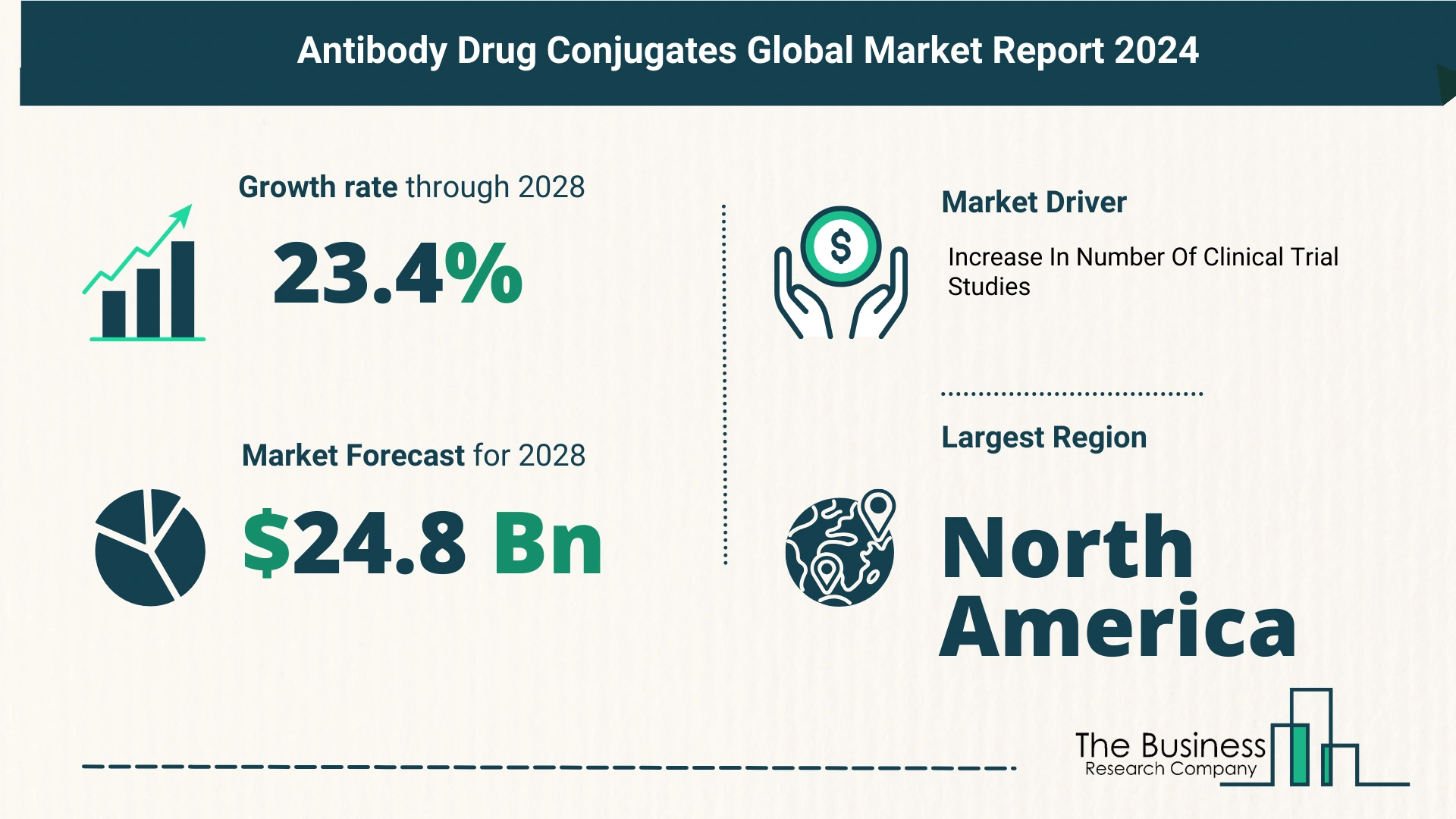Antibody Drug Conjugates Market Report 2024: Market Size, Drivers, And Trends
The Business Research Company’s global market reports are now updated with the latest market sizing information for the year 2024 and forecasted to 2033
The antibody drug conjugates (ADCs) market has seen remarkable growth in recent years, driven by various factors. This blog explores the market’s current dynamics, future projections, and the key trends shaping its expansion.
Market Growth Overview
- 2023 Market Size: Valued at $8.78 billion in 2023.
- 2024 Projection: Expected to reach $10.7 billion at a CAGR of 21.9%.
- 2028 Projection: Forecasted to grow to $24.8 billion, maintaining a CAGR of 23.4%.
Key Drivers of Growth
Increasing Prevalence of Cancer
- Cancer Rates: Rising cancer incidence drives demand for effective treatments like ADCs.
- Therapeutic Potential: ADCs offer targeted therapy, minimizing damage to healthy cells and improving patient outcomes.
Clinical Success and Approvals
- Clinical Trials: A significant number of ADCs are undergoing clinical trials, with promising results leading to increased approvals and market confidence.
Strategic Collaborations
- Partnerships: Collaborations between pharmaceutical companies and research institutions enhance R&D efforts, speeding up the development of new ADCs.
Growing Investment in R&D
- Innovation: Increased funding for research and development fuels the creation of next-generation ADCs, expanding their therapeutic potential.
Market Expansion Strategies
- Global Reach: Companies are implementing strategies to expand their market presence, especially in emerging economies with rising healthcare demands.
View More On The Antibody Drug Conjugates Market Report 2024 – https://www.thebusinessresearchcompany.com/report/antibody-drug-conjugates-global-market-report
Future Market Trends
Next-Generation ADCs
- Advanced Therapies: Development of next-generation ADCs with improved efficacy and reduced side effects.
- Expanding Indications: ADCs are being developed for a broader range of cancers and potentially other diseases.
Personalized Medicine
- Tailored Treatments: Focus on personalized medicine to create targeted therapies based on individual patient profiles.
Precision Medicine
- Investment: Rising investment in precision medicine enhances the ability to develop highly targeted ADCs, improving treatment outcomes.
Healthcare Awareness
- Education: Increased awareness about advanced cancer treatments drives demand for ADCs.
Technological Advancements
Conjugation Technologies
- Innovations: Advancements in conjugation technologies improve the stability and efficacy of ADCs.
- Improved Tumor Biology Understanding: Better understanding of tumor biology aids in designing more effective ADCs.
Expanding Therapeutic Applications
- Beyond Cancer: Potential use of ADCs in treating other diseases, expanding their therapeutic scope.
Advanced Conjugation Technologies
- Enhanced Precision: New conjugation methods lead to more precise targeting of cancer cells, minimizing side effects.
Increasing Number of Clinical Trials
Clinical Trial Growth
- Rising Numbers: The number of clinical trials for ADCs has significantly increased, with over 450,000 registered trials globally.
- Impact: More clinical trials mean faster development and approval of new ADC therapies.
Market Impact
- Fueling Growth: The surge in clinical trials is expected to propel the ADC market further.
Major Companies in the ADC Market
- Key Players: Pfizer Inc., F. Hoffmann-La Roche Ltd., AbbVie Inc., Bayer AG, AstraZeneca PLC, GlaxoSmithKline PLC, and others.
- Innovations: These companies are at the forefront of developing innovative ADCs and expanding their market presence.
Innovative Breakthroughs
Affordable New Therapies
- Biosimilars: Launch of biosimilar ADCs like Ujvira by Zydus Cadila, providing affordable treatment options.
- Treatment Impact: Ujvira, used for breast and stomach cancer, exemplifies how innovative breakthroughs can lower treatment costs.
Market Segmentation
By Type
- Monoclonal Antibodies, Linker, Drug/Toxin: Various components of ADCs.
- Product Examples: Adcertis, Kadcyla, among others.
By Technology
- Immunogen, Seattle Genetics, Immunomedics: Key technologies driving ADC development.
By Application
- Cancer Types: Blood cancer, breast cancer, ovarian cancer, lung cancer, brain tumor.
By End User
- Hospitals and Clinics: Primary users of ADCs.
Regional Insights
North America
- Largest Market: Leading region in the ADC market in 2023.
Middle East
- Rapid Growth: Expected to be the fastest-growing region during the forecast period.
Conclusion
The antibody drug conjugates market is poised for exponential growth, driven by technological advancements, increased clinical trials, and strategic collaborations. With a focus on personalized and precision medicine, the future looks promising for this innovative segment of the healthcare industry.
Request A Sample Of The Global Antibody Drug Conjugates Market Report 2024:
https://www.thebusinessresearchcompany.com/sample_request?id=2569&type=smp



